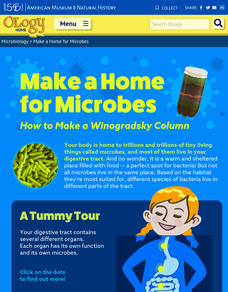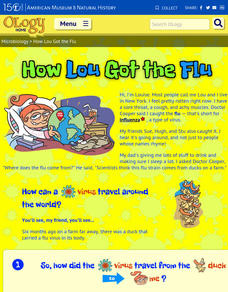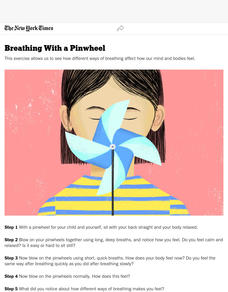Core Knowledge Foundation
The Human Body—Systems and Senses Tell It Again!™ Read-Aloud Anthology
Nine lessons over three weeks explore the human body through read-alouds. Third graders listen to and discuss a reading followed by extension activities, including word work and comprehension practice. Learners draft a narrative essay.
Core Knowledge Foundation
The Human Body—Building Blocks and Nutrition Tell It Again!™ Read-Aloud Anthology
A read-aloud anthology explores the human body. Over three weeks, second graders listen to and discuss texts related to the cells, tissue, organs, digestive system, excretory system, nutrients, and a balanced diet. Learners practice word...
Core Knowledge Foundation
The Human Body Tell It Again!™ Read-Aloud Anthology
A read-aloud anthology showcases various stories about the human body. Scholars participate in lessons that introduce a reading, listen to and discuss the reading, then complete in-class and at-home practice.
Curated OER
Wired with Alexander Calder
Kids consider how the body functions and moves, how each structure has a specific movement and purpose. They apply that idea as they construct a sculptural piece that moves. For inspiration they look to the work of Alexander Calder,...
University of Minnesota
Ways of Knowing: Apples as Models
Use apples as a way of thinking about models. Young scientists consider how the word apple, a two-dimensional drawing, a three-dimensional image, a photograph, and plastic apples all model real apples in preparation for developing models...
K20 LEARN
Are We Golden?
Lead your class on a search for precious bones. Using a presentation, the class investigates the golden ratio in art and nature. Groups of pupils measure specific bones and find the average ratio for the class. To further cement the...
Nemours KidsHealth
Alcohol: Grades K-2
Two lessons focus on alcohol's effects on the human body and encourage participants to make responsible choices. First, scholars identify five adults they can turn to for guidance and craft a construction paper hand that lists the...
Nemours KidsHealth
Head Lice: Grades K-2
Head lice—how not to get or give it. Scholars read or listen to kid-friendly articles that offer information about head lice. They complete a worksheet that identifies items they should and should not share with their peers.
Nemours KidsHealth
Bike Safety: Grades 3-5
Bicycle safety is the focus of two lessons. First, scholars read three articles and decide which five safety tips are most important. Second, class members practice hand signals used while riding a bicycle to stay safe.
Nemours KidsHealth
Concussions: Grades 3-5
Two lessons focus on concussions. The first instructional activity uses cards and role-playing to detail signs of a concussion. Through readings, discussions, and worksheets, the second instructional activity looks closely at parts of...
American Museum of Natural History
What Do You Know About the Human Microbiome?
Scholars answer 10 multiple choice questions to test their knowledge about the human body and microbes. Correct answers come with a rewarding tone and brief description.
American Museum of Natural History
Make a Home for Microbes
Make a Winogradsky Column to discover how microbes live within the digestive tract. First, participants take a tour of the stomach. Then, gather supplies and start building using a variety of materials. Over eight to 10 weeks, learners...
American Museum of Natural History
How Lou Got the Flu
Six questions probe participants to discover the possibility of catching a virus from others—even animals. Here, the influenza virus travels from duck to person in a round-about way. The quiz concludes with helpful tips to stay healthy.
Nemours KidsHealth
Food Allergies: Grades 6-8
Over two lessons, scholars use articles and discussions to define what a food allergy is and identify the most common food allergens. Small groups prepare a skit showcasing how the body exhibits an allergic reaction. Learners examine...
Cengage Learning
COVID-19: What Can I Do?
Eleven slides make up a presentation that details the importance of practicing social distancing and what can be done at home during the COVID-19 pandemic. Scholars take part in the classroom discussion highlighting topics such as...
Cengage Learning
COVID-19: What's It All About?
Scholars discover the novel virus COVID-19. Pupils fill out the K and W of a KWL chart in preparation for a viewing of an informative presentation. After ten slides, class members discuss their new-found knowledge, fill out the L of the...
Cengage Learning
COVID-19: How Do I Protect Myself?
Since COVID-19, the novel coronavirus, is so easily transmitted, we must take preventative measures to keep others and ourselves from getting sick. Scholars learn about these measures in a lesson that introduces information by way of an...
Children’s Hospital of Philadelphia
Meet the Germs
A lesson introduces scholars to the scientist, Martinus Beijerinck, the person behind virus discovery. Learners research and complete a graphic organizer that showcases the differences between a virus and bacteria. Small groups share...
Children’s Hospital of Philadelphia
Meet the Heros
Vaccine development is the focus of a lesson that explores its history, timeline, and how the scientific method aids the process. Following a discussion about Edward Jenner and Small Pox, learners answer questions in their journals then...
Nemours KidsHealth
Head Lice: Grades 3-5
Keep lice away with a instructional activity that focuses on best practices. Scholars discuss what lice are, where it can be found, how it can be prevented and cured. A worksheet challenges pupils to examine items they use every day. A...
The New York Times
Breathing With a Pinwheel
A pinwheel encourages deep breathing to calm one's body and recenter their thoughts. Scholars breathe into a personal pinwheel with different types of breathing patterns then answer a question about how they feel.
Missouri Department of Elementary
How Much Does Smoking Really Cost?
Following a brief survey about tobacco, scholars examine a fact sheet to answer questions about the substance. A practice page challenges the class to determine the cost of the habit using money math. Pupils discuss their findings...
Missouri Department of Elementary
Healthy Touches and Private Touches
Scholars identify the difference between healthy touches and private touches. A discussion leads pupils to recognize several trusting adults. Peers role-play scenarios in which they use three rules to remain safe.
American Museum of Natural History
Differentiate! The Stem Cell Card Game
Let the games grow. Groups play a card game to grow cells. Players start growing cells from stem cells to create specialized cells in the human body. Learners use full-grown cells from the human body to create stem cells in the lab to...























